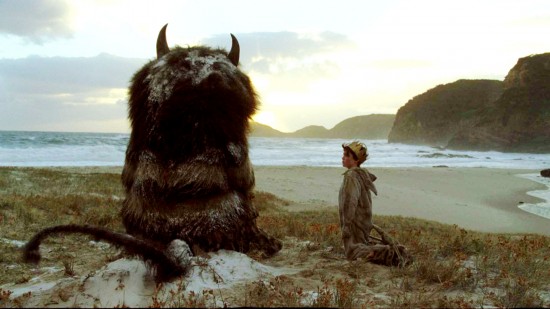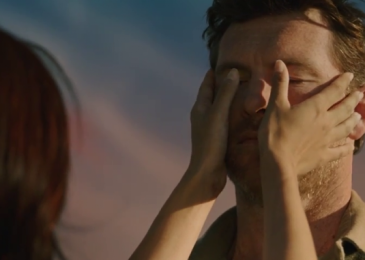Back when I started this blog, I created a list of some of my favorite critics. Top of that list was Drew McWeeny, who writes the Motion Captured blog for HitFix. I’ve been following Drew’s writing since his Ain’t It Cool News days, and he is one of the critics I most trust. I don’t always agree with his opinions — although, more often than not, we share sensibilities — but I always understand where he’s coming from. And as I said in that original piece, I think he weaves his personal life into his reviews with the same delicacy and honesty that Roger Ebert did.
One way he’s done that has been through his Film Nerd 2.0 series. The father of two young boys, Drew’s spent the past few years writing about his experiences guiding them through cinema and pop culture. The series is a delight. He began it in 2009 and has, through the years, discovered what might be the perfect viewing order for “Star Wars,” wrestled with a difference of opinion on “The Goonies,” and introduced them to hard talks about our sometimes ugly world with “To Kill a Mockingbird.” The series is often very funny but also astonishingly intimate, as when the three watch “Where the Wild Things Are” or in the entries where a newly divorced Drew struggles with a changing, difficult family dynamic.
There are some who say that critics should leave their personal lives out a review, but I don’t buy it. Anyone with an MFA can have a sterile conversation about what makes a film good. Don’t get me wrong; those reviewers are needed and vital to our understanding of art. But I’ve always appreciated critics who start a dialogue with their readers and let a bit of autobiography slip into their reviews. Our stories affect the way we view a film, and our lives can be profoundly changed by a work of art. And while a dissection of a film’s shots can be great — and an appraisal of its technical merits is essential to an effective review — I’m most galvanized by discussions about art that hit somewhere more intangible. The films that rock us to our core, shift our viewpoints and help us find common ground — those are the ones I want to talk about. And in Film Nerd 2.0, Drew hasn’t just watched movies with his kids; he’s seen them in a new light, helped his boys understand the world they’re growing into, and created experiences with his sons that are forever memorialized. It’s one of the best examples I’ve seen of engaged fatherhood in a pop culture climate, of walking with your children into an experience instead of shouting some pointers from the sidelines.
Yesterday, Drew launched a Kickstarter for a Film Nerd 2.0 book and screening series. The book would be a collection of Drew’s Film Nerd 2.0 essays, along with new reviews and writings, that serve as a guide to introducing children to media. There isn’t much detail about what the screening series would be, but I think the idea of a family film festival curated by a film critic and pop culture nerd —especially one who’s lived and breathed it as a screenwriter for more than two decades —would be so much better than the “Come see ‘Despicable Me’ for a buck” specials at your local theater.
I don’t normally follow Kickstarters or write about them, but this one obviously holds an interest for me. For one, as I said, I’m a longtime fan of Drew’s writing. But more than that, it’s something I find needed in my own life (as I’ve written before). When he started writing Film Nerd 2.0, it was an interesting column to me, but that was about it. At the time, I had just met the woman who would become my wife, and marriage and children were way off. Today, I have two kids, and we’ve just reached the age where I have to really start thinking about what’s going before their eyes, what that means and how to make sense of it. My daughter, Cece, is only 11 months old, but my son, Mickey, is 4, and he’s picked up his dad’s obsession with TV and movies. We’ve already made the mistake of teaching him how to use Netflix, and it’s difficult to figure out what will excite and enrapture him in a world where “Minions” just want to barrage him with fart jokes.
What Drew is doing here is necessary for any parent concerned about their kids’ media diets. I find that most parents’ rules about what their kids can watch usually only boils down to content. If it’s G or PG and has no bad language or sex, it’s fine, and they’re content to turn on the TV and just let the kids consume whatever they want. Or they go the other route, turn off the television and prohibit them from watching anything; with my proximity to Christian culture, I’ve seen this too many times. Parents think abstaining from entertainment is the key to protecting their kids instead of watching alongside them, speaking with them and engaging what they’re seeing. Parents are too concerned about their kids watching “clean” movies instead of them watching good ones.
I think much of this, especially in Christian culture, comes from a background where adults have also been taught to abstain instead of engage. Too many haven’t been taught that there is a way to view a movie and engage with the text, even when you disagree with what the artist is saying. We’ve been taught to accept empty entertainment instead of letting ourselves be provoked to wonder and awe by what’s on the screen — and then we do it with our kids. We hold off on works that might challenge or engage our children because we’re afraid they won’t understand it, instead of taking the time to watch the film with them, ask them questions and help them chew through it. And while there is definitely a place to be concerned about content, we turn it into the be-all, end-all of the experience, instead of helping our kids as they wade through tricky waters, learn to watch with discernment and engage art with wisdom. One of Drew’s best pieces involves his decision to let his son watch the R-rated “Halloween,” and it’s a reminder that a father’s job partly involves walking with his son through his transition into adulthood. I’m very thankful for a father who, when I was ready, didn’t just say “go watch an R-rated movie,” but sat with me and watched “Die Hard” or “Halloween” (or, in a misguided attempt, “The Texas Chain Saw Massacre”). It didn’t always work — and it doesn’t always work in Drew’s columns — but I appreciate the attempt.
We’re rightfully concerned with teaching our kids how to grow up and be conscientious people, mind their manners, respect others and learn life lessons. But we seem, as a culture, to be less concerned with helping them avoid consuming empty entertainment. With Film Nerd 2.0, Drew’s shown how important it is to teach children to think about the art they watch, learn what they like, try new things and build these experiences with family. It’s important, good work and I’m eager to see what comes of it.
You can read Drew’s Motion Captured blog at Hitfix.




